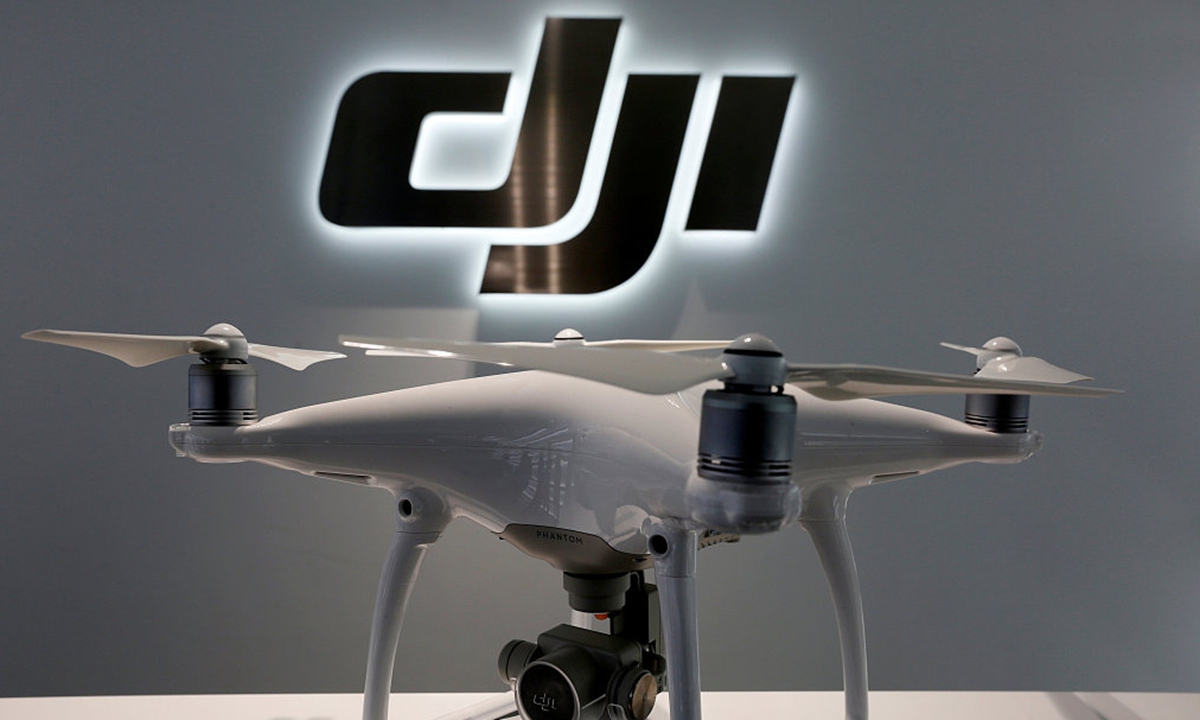
DJI Photo:VCG
Chinese commercial drone maker DJI said Saturday it has sued the US Department of Defense (DoD) for designating it as a military company and adding it to a blacklist. This development has attracted widespread attention. DJI described the DoD's designation as "erroneous" and noted it has caused significant financial losses for the company. For a long time, the US has unfairly suppressed Chinese enterprises under the guise of an overstretched concept of security, with the Pentagon playing an infamous role in "blacklisting" Chinese companies and providing "poor evidence." DJI's lawsuit against the Pentagon also serves as a public condemnation of US hegemony.
Media reports indicate that after the DoD blacklisted DJI, claiming it has "links" to the Chinese military, it refused to communicate with DJI or provide reasons for the accusations, ultimately offering only a copy of an internal report that fails to substantiate its designation as a "military company." Such actions, based on speculation and prejudice, seriously damage DJI's commercial reputation and market opportunities. As a company focused on the research and manufacturing of civilian drones, DJI's products are widely used in agriculture, infrastructure, public safety and other fields, contributing positively to the development of people's livelihoods globally. The Pentagon's unfounded association of DJI with the military is not only an unfair treatment of the company but also stigmatizes Chinese enterprise.
It should be pointed out that the Pentagon's actions are not a case of "collateral damage," but rather a pattern of behavior by a "recidivist." Due to the often arbitrary process of determining whether a company is "military-related," the Pentagon has faced lawsuits from Chinese companies before. In 2021, Chinese smartphone manufacturer Xiaomi successfully forced the Pentagon to remove it from a US "military-ties list" through litigation. In May of this year, Hesai Technology, a global leader in lidar solutions, also sued the Pentagon for a similar reason. Absurdly, after the Pentagon "removed" Hesai from the blacklist, recent reports have suggested that it may be "re-added" to the list. This back-and-forth process exposes the arbitrariness of the US side in labeling Chinese enterprises as so-called "threats to national security."
However, arguing that the Pentagon's practice of blacklisting Chinese companies is "illogical" is not entirely correct. Looking back at the experiences of Japanese companies like Toshiba and Hitachi, the French company Alstom, and today's Huawei and DJI, one could argue that their experiences serve as historical markers of American hegemony. In these cases, Washington's tactics have remained largely unchanged for decades: When a company produces high-quality products and gains a significant market share, Washington becomes envious and spares no effort to use government power to stigmatize and "liquidate" it.
Without evidence, it endlessly demands that the company prove its innocence, seeking to exhaust or acquire the company from all directions. What is being done to Chinese companies today is not novel; any outstanding company from any country could become a US government's similar target.
At the same time, the American public is also one of the direct victims of this hegemonic logic. Take drones as an example. Despite the various obstacles unilaterally set by the US for DJI, its products are still widely used by federal government agencies, enterprises, and enthusiasts in the US. Even The New York Times acknowledges that "A Chinese Firm Is America's Favorite Drone Maker. Except in Washington." As soon as the news of the US ban on DJI emerged, it sparked widespread opposition, as emergency rescue operations, agricultural spraying, and other tasks heavily rely on DJI products. Blocking DJI is tantamount to a "rapid regression" in these fields and does not contribute to the technological advancement of consumer drones in the US. Clearly, the negative impact of the US crackdown on DJI in its domestic market has already become apparent.
The Pentagon's blacklisting can be applied and removed repeatedly, but Chinese companies have never relinquished their right to litigation, as the struggle against American hegemony is a long-term endeavor.
DJI's lawsuit against the Pentagon aims to bring the truth to light and hold Washington's hegemonic logic accountable in the international community. The US sanctions will not only strike a blow to DJI and affect China-US economic and trade cooperation, but they will also disrupt global supply chains, hindering technological cooperation and progress worldwide. Therefore, the significance of DJI pursuing this lawsuit is not only to protect its own reputation and development rights, but also to defend the rules of fair competition in the market as well as the principles of fairness and justice in the international order.
The international community is watching closely, and when the rules and facts are clearly laid out, what choice will the US make between adhering to the rules and engaging in political trickery?




